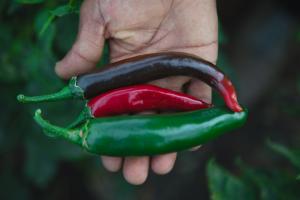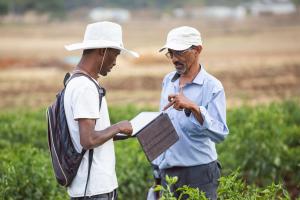Doubling the income of 3,000 Ethiopian farmers via the Sustainable Vegetable Value Chain (SVVC) project
The Development Fund of Norway (DFN) and Farmforce embarked on the SVVC project to improve the traceability of cabbage, tomato, and spices in Ethiopia.
"Farmforce remains passionate and engaged in providing farmers the pertinent data and insights to competitively trade in international markets as quickly as possible."”
OSLO, NORWAY, June 23, 2022 /EINPresswire.com/ -- In 2019, the Development Fund of Norway (DFN) started the Sustainable Vegetable Value Chain (SVVC) project to improve the livelihood of over 3,000 Ethiopian smallholder farmers in the Amhara region and double the export market for 50 medium/large scale farmers in Tigray regions, respectively. Leveraging two on-the-ground partners, they provided farmers with high-quality seedlings and trained them on how to make the most out of them (e.g., optimal dosage and frequency rate of agricultural inputs for protecting crops). — Anne Jorun Aas, CEO at Farmforce
However, their interventions require managing heaps of information in an effective way. Therefore, to supercharge the impact of their program, the DFN reached out to Farmforce. The scale-up software, designed for seamless collection and processing of food’s first mile data, replaced the manual and paper-based method of tracking farmers' training, agricultural inputs, growing activities, vegetable yields, etc.
“Farmforce has enabled all the partners within this project to access information right from land preparation to seedling purchase, input application management, through to the harvest and marketing.” Rodney Muriuki, Global Sales Director at Farmforce, said. “Before the SVVC project, these farmers only had one source of income during the year, because the staple crop season in this part of Ethiopia runs from July. I think the harvest is about in October or November, and so the income would come by the end of the year. By the second week of January, they do not have any more money and so the introduction of the vegetables for a sustained cash flow is key for them.”
“Most of the benefits that you get from this technology, unlike the conventional project, is that it can track the activities of the project, starting from land preparation up to marketing,” Alemayehu Sitotaw, Senior Agri-Business & Value Chain Advisor at DFN, said.
In a survey conducted by the DFN, field-level operators acknowledged a series of benefits of using Farmforce food tech, including higher-quality data and reporting, lower workload, and a more effective project management cycle. Based on their experience, web and mobile users recommended scaling up the application of the food traceability software.
Despite global COVID-driven disruptions and the ongoing armed conflict in Ethiopia, the SVVC project achieved outstanding results in 2021. Since the beginning of the program, tomato and cabbage productivity rose by 100%. Benefiting from the increased crop yields, farmers doubled their earnings compared to the pre-intervention level. Supported by the vegetables’ sales proceeds, growers invested in livestock or family-related expenses (e.g., school fees, clothes, etc.), thus improving their quality of life.
“The farmers are still making surpluses in terms of income. They can provide for their families through vegetable production. And they continue to produce at a much higher rate than before the project started.” Ulf Flink, DFN’s regional head, said.
As this successful project comes to an end, the partnership is eager to extend it to other areas of the country where farmers are still too close to the poverty line.
“80% or even more of the population are smallholder farmers. There is a need to increase the productivity and production of vegetables in Ethiopia,” said Ulf Flink. Farmforce’s CEO, Anne Jorun Aas agrees, "Farmforce remains passionate and engaged in providing farmers the pertinent data and insights to competitively trade in international markets as quickly as possible."
To add to that, the DFN is keen on fulfilling another grandiose goal: Doubling the vegetable export market for medium-to-large-scale farmers. While this was one of phase I’s objectives, the non-stop war has hampered their ambitious plan so far.
“Hopefully in the next phase of this project, we can work with this segment of farmers elsewhere in the country if needed or in Tigray, helping them with the business licensing, helping them to professionalize their production. So that they ultimately can reach regional and international markets and become competitive.” Ulf Flink said.
For more information, please click here to read our full case study.
Arnaud Dupuis
Farmforce
+47 486 63 301
email us here
Visit us on social media:
Twitter
LinkedIn
Other
DFN x Farmforce: Doubling the income of 3,000 Ethiopian farmers via the SVVC project



